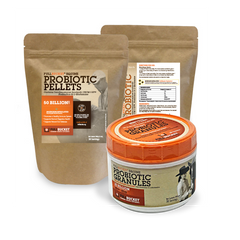Why do we care so much about the one-letter difference??
Because your horses need both pre- and probiotics for a thriving microbiome and overall well being.
Let’s start at the beginning.
What are prebiotics?
Prebiotics are undervalued indigestible ingredients that help beneficial gut bacteria grow and flourish. You can think of prebiotics as fertilizer or food for all those good gut bugs that make up the microbiome.
Since prebiotics are non-digestible by the body’s normal digestive processes, they make it through the stomach and small intestine to the large intestine (cecum and colon) where they are fermented and degraded by horses’ gut bacteria.
As gut bacteria degrade prebiotics, they not only feed the gut bacteria, but also produce butyrate and propionate, which positively impact immune function and the integrity of the digestive tract.
While there are many beneficial side effects of prebiotics, just remember that they exist symbiotically with gut bacteria (probiotics) to create a healthymicrobiome in us and our animals.
Types of Prebiotics
Because more research into prebiotics is needed in general, they are often categorized in different ways. For the purposes of this article, we will classify them into 3 main subgroups:
- Fructo-Oligosaccharides (FOS)
- Galacto-Oligosaccharides (GOS)
- Mannan-Oligosaccharides (MOS)
The most important thing to realize is that the most well-known prebiotics are “oligosaccharides,” meaning that they are derived from carbohydrates.
FullBucket’s prebiotic is labeled as “Saccharomyces cerevisiae cell wall extract” and is a special blend of MOS + Beta 1,3 & 1,6 Glucans (another type of carbohydrate).
What are prebiotics good for?
Prebiotics help modify the gut environment through feeding beneficial bacteria. One of their coolest anecdotal features (we need more research in this area) is that they can bind to bad bacteria and help remove them from the intestinal tract.
Additionally, it is important to mention that there is MUCH unknown about the microbiome (think of it like the Wild West). We probably only know a fraction of what types of bacteria live in the gut.
What is arguably one of the most critical roles of prebiotics is that they feed ALL beneficial bacteria in the intestinal tract, whether we as humans (and scientists!) know these bacteria exist or not.
Prebiotics are underestimated. But they REALLY contribute to a thriving digestive tract.
To read more about the microbiome, check out this 5 part series about mares and foals on our blog.
Best prebiotics for horses
There’s many horse feeds on the market claiming to contain prebiotics. So you might be wondering why you should care about adding additional prebiotics to the horse’s diet.
If you have a chance to read the feed tags on these feeds, you might have a difficult time finding the prebiotics. They very well might be in that feed, but it’s challenging to be certain since you can’t always find them listed on the guaranteed analysis.
Even if we assume that commercial grains do contain small amounts of prebiotics, remember that prebiotics are VERY SAFE, and your horse will only benefit from high-quality supplementation.
Because we believe in full transparency and testing our products before selling them, FullBucket’s equine probiotic granules and equine probiotic pellets GUARANTEE between 5,000 and 10,000 mg of prebiotics, respectively, so you can be sure that you are supporting your horse’s gut with the necessary ingredients it needs to actually make use of the probiotics you are also feeding.
Think about gut health for horses as an equation:
Prebiotics + Probiotics = An Elevated Gut Microbiome


